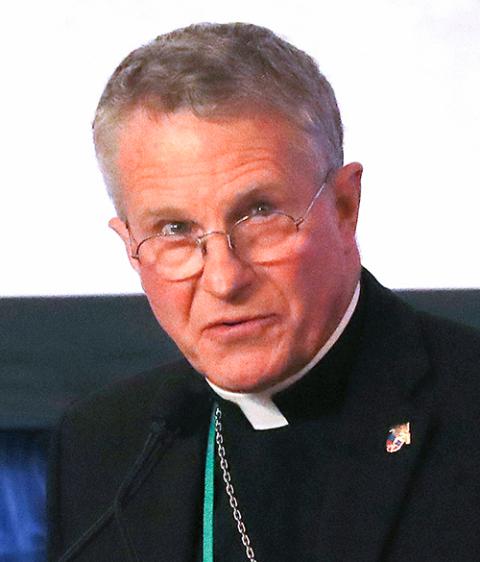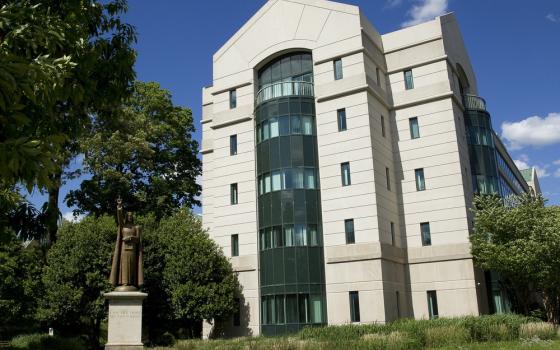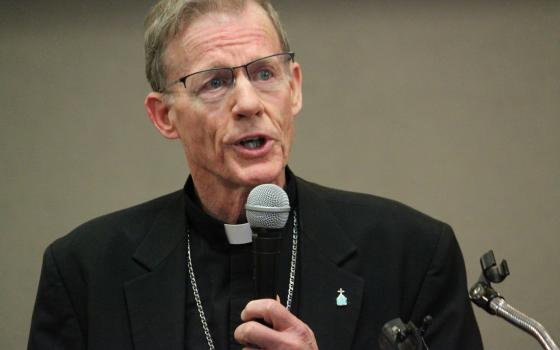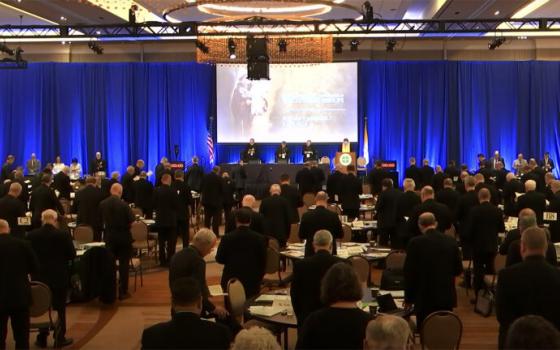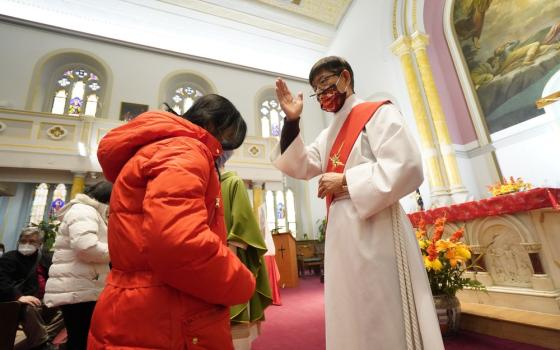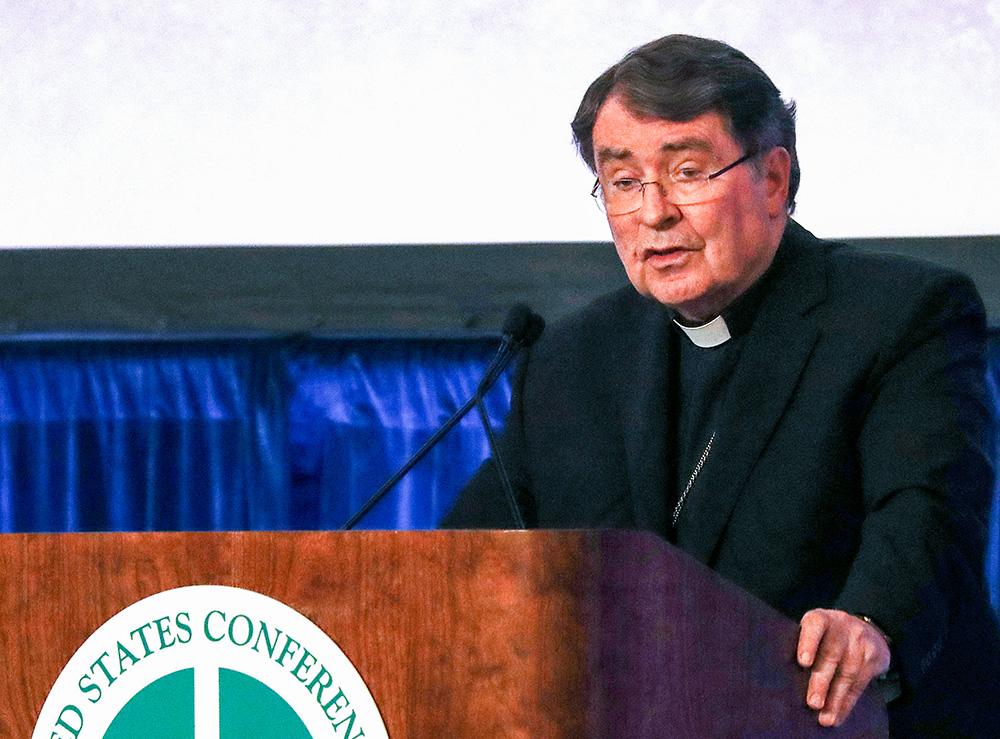
Cardinal Christophe Pierre, the Vatican nuncio to the United States, speaks June 13 at the U.S. Conference of Catholic Bishops' spring plenary assembly in Louisville, Kentucky. (OSV News/Bob Roller)
Editor's note: This story has been updated to add Archbishop Timothy Broglio's remarks to the press.
Taking a different tactic from his previous addresses to the U.S. Catholic bishops, the Vatican's ambassador to the United States on June 13 affirmed the prelates' preparations for a National Eucharistic Revival and National Eucharistic Congress.
In his opening address to the bishops' annual spring assembly, Cardinal Christophe Pierre told the U.S. bishops that Pope Francis shared their desire that Catholics in the United States "rediscover the power of the Eucharist" and that they embrace practices meant to reinforce eucharistic piety, such as adoration of the Blessed Sacrament.
"We want our people to come to a renewed and deeper appreciation of Christ's presence in the Eucharist. We want them to know that Christ is there for them in the Eucharist, to accompany them in their earthly journey, and to feed them with the bread of life," Pierre said.
The nuncio's remarks signified a departure in tone and substance from his most recent speeches to the U.S. Conference of Catholic Bishops, which is meeting June 12-14 in Louisville, Kentucky.
At both the spring and fall meetings in 2023, Pierre appeared to reference the resistance among conservative U.S. Catholics and some bishops as he challenged the American hierarchy to embrace Francis' vision for a synodal church.
Advertisement
"Maybe we are still struggling to understand synodality," Pierre told the bishops in Orlando, Florida, on June 15, 2023.
"We may have had fears and anxieties about the synod, especially if we are focusing on a particular agenda or idea, whether positive or negative, but this is not what synodality is all about," Pierre said in Baltimore on Nov. 14, 2023.
But in Louisville, Pierre likened the American bishops' plans for eucharistic revival, including the ongoing eucharistic pilgrimages that will culminate in the July 17-21 National Eucharistic Congress in Indianapolis, with the story of the apostles encountering the resurrected Christ.
Noting biblical accounts that describe the risen Jesus as still having his wounds, Pierre reflected on the healing nature of encountering Christ, especially in the Eucharist. He likened the scarred but redeemed resurrected body of Christ as a metaphor for a church wounded by scandal and various sins, including the clergy sex abuse crisis and polarization among its members.
"These wounds and sufferings are not abstract ideas to us," said Pierre, adding that the church acknowledging those failings while still moving forward with its mission is preferable to trying to "turn the page" as if those wounds have disappeared.
The opening public session of the bishops' plenary assembly in Louisville also featured the American prelates' message to the pope, as well as remarks from Military Services Archbishop Timothy Broglio, president of the bishops' conference. The bishops also received an update on the 2021-24 synod on synodality from Bishop Daniel Flores of Brownsville, Texas. In addition, the bishops were briefed on new pastoral frameworks for young adult and indigenous ministries, as well as the conference's new campaign to raise mental health awareness.
Not on the public agenda was arguably the most controversial item at this spring plenary: the potential revamping or scaling-down of the Catholic Campaign for Human Development, the bishops' domestic anti-poverty program.
The bishops have been discussing the fate of the program in closed-door executive sessions this week in Louisville. Sources, including bishops who spoke anonymously to NCR in order to discuss the closed-door deliberations, said they expected the campaign to survive the chopping block, though they indicated the program's finances will have to be shored up.
In 2022, the most recent year for which information is publicly available, the campaign operated at a $5.7 million deficit, spending about half of the $17 million it had in net assets at the beginning of the year to award about $12.7 million to 192 grant recipients, despite only taking in about $9.2 million in total revenue that year.
Speaking with reporters following the June 13 public session, Broglio said the Catholic Campaign for Human Development — which several years ago had more than $40 million in its long-term reserve fund — was "initially told to spend down their resources."
"Unfortunately, they did that better than perhaps was desirable," said Broglio, who added that the bishops' subcommittee for the campaign received feedback from various bishops during the June 13 executive session.
"They will need to review all the comments and then incorporate the advice into their ongoing work of ensuring that the program is positioned to serve the needs of those striving to overcome poverty," Broglio said.
Without offering specifics on what advice the subcommittee received, Broglio added that the campaign's national collection will be assigned to the bishops' conference office that handles collections for the bishops' other initiatives.
He said that during the June 13 executive session where they discussed the campaign, "in all the discussions, the bishops' ongoing commitment to the vital work of fighting poverty was clear."
In his June 13 speech to the bishops, Broglio commented on the conference's commitment to use resources "in the most effective way," possibly an oblique reference to the controversy over the Catholic Campaign for Human Development, though he did not delve into that specific topic.
Broglio focused the bulk of his remarks on the need to confront various threats to human life, including ongoing global conflicts, divisive political rhetoric that he said will challenge border bishops during the coming election year, and "gender ideology," which he noted the Vatican recently identified as a threat to human dignity in its April 2 document, Dignitas Infinita.
Regarding the National Eucharistic Congress, Broglio encouraged the bishops in attendance to think about how to "capitalize" on the momentum that they hope the event will create. Broglio described the congress as a potential "catalyst for future growth and an ever-deepening appreciation of the gift we have received." In their message to the pope, the bishops also referred to the congress as "a pivotal time for the Catholic Church in the United States."

